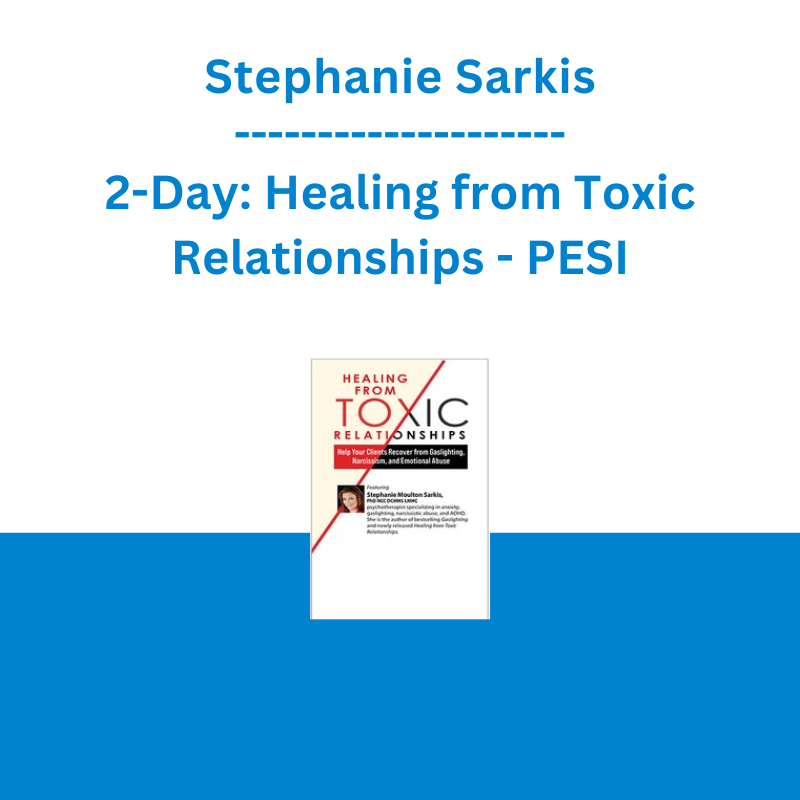*** Proof of Product ***
Exploring the Essential Features of “Stephanie Sarkis – 2-Day: Healing from Toxic Relationships: Help Your Clients Recover from Gaslighting, Narcissism, and Emotional Abuse – PESI”
Description
Toxic relationships come in all types— romantic partners, business partners, parents, siblings, friends…
and everyone, at some point in their lives, has experienced a toxic relationship.
As a therapist you’ll encounter at least one client a month who is preparing to leave or has left a toxic relationship. They’re emotionally fragile, so being well-educated on how to provide the best care for your client is a must – as well as how to deal with your own feelings of frustration when your client returns to the toxic relationship.
Stephanie Sarkis PhD is the author of the best-selling books Gaslighting: Recognize Manipulative and Emotionally Abusive People— and Break Free and Toxic Relationships: Help Your Clients Recover from Gaslighting, Narcissism, and Emotional Abuse.
Watch Dr. Sarkis, for this LIVE two-day webinar where she shows you, through evidence-based practice: trauma-informed therapy, dialectical behavior therapy, solution-focused therapy, acceptance and commitment therapy, cognitive-behavioral therapy, case studies and her 20 years of experience, how to help clients rebuild their lives after the trauma of a toxic relationship:
- Knowing what to do when your client gets “hooked” on the cycle of abuse & reconciliation
- Client who continues to seek out similar toxic relationships
- Moving on without closure
- Letting go of anger and self-blame
- Establishing boundaries
- Practicing self-care
- Grief – working through the loss
- Rebuilding emotionally healthy relationships
Don’t miss out on getting answers to an all-too common but underdiscussed personality type!
Speaker
Stephanie Sarkis, PhD, NCC, DCMHS, LMHC
Author, Psychotherapist
Stephanie Moulton Sarkis, PhD, NCC, DCMHS, LMHC, is a bestselling author and psychotherapist specializing in anxiety, gaslighting, narcissistic abuse, and ADHD. She is the author of several books, including the best-selling Gaslighting: Recognize Manipulative and Emotionally Abusive People – and Break Free and 10 Simple Solutions to Adult ADD: How to Overcome Chronic Distraction and Accomplish Your Goals. She was named a Diplomate and Clinical Mental Health Specialist in Child and Adolescent Counseling of the American Mental Health Counselors Association, one of only 20 professionals in the United States with this dual designation. Dr. Sarkis is also a National Certified Counselor, Licensed Mental Health Counselor, and a Florida Supreme Court Certified Family and Circuit Mediator. Dr. Sarkis is the founder of the Sarkis Institute, specializing in the treatment of comorbid anxiety and ADHD. She is a contributor to Forbes, Psychology Today, and The Huffington Post. Her Psychology Today posts have been viewed over 35 million times. Her Psychology Today article “11 Warning Signs of Gaslighting” went viral, with over 13 million views. She has taught the graduate-level class Diagnosis and Assessment of Mental Health Disorders, in addition to, Law and Ethics of Counseling at the University of Florida and Florida Atlantic University. She is the host of The Talking Brains podcast and the cohost of the Nerds in Love podcast.
Dr. Sarkis earned a PhD, EdS, and MEd in Mental Health Counseling from the University of Florida, named by US News and World Report as the top counselor education program in the country. Dr. Sarkis has appeared on CNN, 10% Happier with Dan Harris, Sirius XM Doctor Radio, ABC (U.S.), ABC (Australia), and many more media outlets. Her research on comorbid ADHD and its impact on pediatric executive function was published in the Journal of Attention Disorders. She is based in Tampa, Florida, where she provides evaluations and psychotherapy via telehealth. She has been in private practice for 20 years.
Speaker Disclosures:
Financial: Dr. Stephanie Moulton Sarkis maintains a private practice. She serves as a contributor to Forbes, The Huffington Post, and Psychology Today and is an advisory panel member for Evergreen Certifications. Dr. Sarkis is a facilitator for Collaborative Divorce. She receives royalties as a published author. She receives a speaking honorarium, recording, and book royalties from PESI, Inc. She has no relevant financial relationships with ineligible organizations.
Non-financial: Dr. Stephanie Moulton Sarkis is a professional expert for Understood.org, part of the National Center for Learning Disabilities. She is a member of the Attention Deficit Disorder Association, American Mental Health Counselors Association, Children and Adults with Attention Deficit Disorder, and the National Board for Certified Counselors.
Objectives
- Employ evidence-based practice from trauma-informed therapy, dialectical behavior therapy, solution-focused therapy, acceptance and commitment therapy, and cognitive-behavioral therapy to assist clients in rebuilding their lives.
- Assess suicidality effectively and treat it through integrative psychodynamic psychotherapy and dialectical behavior therapy.
- Determine a diagnosis of complex PTSD through trauma-informed interviewing skills.
- Evaluate the research-based benefits of altruism through volunteering in increasing self-esteem and self-efficacy.
- Analyze how parental alienation further traumatizes clients and their children.
- Build 10 tools to help clients reestablish healthy boundaries via research-based activities.
- Utilize clinical strategies to uncover and heal client’s family-of-origin trauma.
- Minimize symptoms of post-traumatic stress disorder through trauma-informed therapeutic techniques.
- Prescribe individualized therapeutic care to improve client engagement when discussing experience of abuse.
- Determine level of family-of-origin pathology in order to inform choice of treatment interventions.
- Demonstrate knowledge of vicarious trauma for purposes of reducing clinician burnout.
- Diagnose complex post-traumatic stress disorder in a clinical setting.
Outline
Neurochemical Cycle of Abuse: Every Day is a Recovery
- Harder to leave when trauma bonding has occurred
- Abuse = cortisol levels and adrenaline increases
- Reconciliation = dopamine and oxytocin increase
- Client’s brain can get addicted to this cycle
- Withdrawal and/or reframing grief after the relationship (i.e., drug withdrawal)
Phases of Toxic Relationships – Cycle of Abuse
- Attachment Style – Predictor of abuse vulnerability
- Idealizing – Relationship begins – seems too good to be true, pressured commitment
Results of Toxic Relationships
- Complicated grief
- Questioning what was “real” in the Relationship
- Complex PTSD
- Dissociative episodes
- Brief psychotic episode
- Dissociative identity disorder
- Suicidality
- Case study: Sarah, a 52-year-old female who is experiencing complex grief as a result of an abusive family of origin and abusive relationship
Returning to the Toxic Relationship
- Leave toxic relationships at least three times before they leave for good or are killed
- Abusers “hoover” victims to get their “narcissistic supply”
- Therapists may start “fixing” rather than supporting client – codependent behavior
Solution-Focused Therapy to Relearn Self-Care
- Creating future plans
- Emotional and physical safety
- ADL’s – in extreme cases
- Reconnecting with healthcare (infidelity, etc)
- Seeking injunction – restraining order
- Reframing self-care as a necessity rather than a luxury
- Case study: James, a 53-year-old male relearning basic life skills that were lost as a result of severe abuse and depression
Trauma-Informed Therapy to Break Free from Codependence
- Multicultural therapy’s view that codependence is a culture-bound term
- Multi-cultural implication – divorce, religious, traditional gender roles/abuse
- Determining clients “secondary gain” from codependent behavior
Toxic Family of Origin
- Abuse can be intergenerational
- Family of origin substance abuse
- “Splitting” – golden child and a scapegoat child
- Siblings may maintain dysfunctional roles into adulthood
- Using genograms to identify client’s familial behavior patterns
- Transgenerational family therapy
- Caregiving and elderly toxic parents
Existential Therapy Tools to Manage Suicidality
- Best way to assess for suicidality according to research
- Myths about suicidal behavior
- Hidden signs of suicidality
- Evidence-based treatment of suicidality resulting from abuse
- Case study: Emma, a 17-year-old who has ended an abusive relationship
Coparenting with a Toxic Personality
- Parental alienation
- Using detailed parenting plan
- Resources available – parent coordinator, family law attorney (some do pro bono work)
- Communicate via a coparenting app
- Case study: Ian, a 48-year-old who is learning how to coparent with their ex-partner who has been diagnosed with narcissistic personality disorder.
DBT & Grief Therapy Techniques to Redefine Closure
- Toxic person will not give closure
- Toxic people keep exes and friends “in rotation”
- Helping clients find their own closure
- Forgiveness is not necessary for closure
- Dangers of pushing an agenda of forgiveness on clients
- Sometimes closure is not possible
- Clients can have fulfilling lives without closure or forgiveness
Reconnecting with Trusted Friends and Family
- Reassessing emotional health of client’s loved ones
- Client’s level of disclosure about the abuse to friends and family – how much is too much
- Case study: Jimmy, a 28-year-old male reconnecting with family after going no-contact with his mother
ACT & Trauma-Focused Techniques to Help Client Forgive Themselves
- Forgiving can be a continual process
- Empty chair and writing techniques
- CBT – changing inner dialogue (to non-violent communication)
- Altruism as pathway to healing volunteerism – increase self-esteem and self-concept
The Power of Language in Session
- When to refer to a relationship as “abusive”
- Go at same pace of your client
- Ask client what words they prefer
- Some words can be triggers
- Case Study: Sheila, a 38-year-old mother of two who feels she is the cause of the difficulties in her marriage
Trauma-Informed and Solution Focused Therapy – Prepare for Life After a Toxic Relationship
- Helping clients identify signs of a healthy person
- Addressing client’s concerns about a healthy relationship feeling “boring”
- Addiction to the excitement of a toxic relationship
- Reviewing client’s progress
TIPS for Therapists
- Attend regular therapy sessions and clinical supervision
- Beware of client’s experiences triggering your trauma
- Expect to be contacted by abuser
- You may be involved in litigation
- Protecting yourself and your practice
- Look for signs of burnout
- Practice proactive self-care
Target Audience
Mental health professionals who specialize in women’s issues, work in domestic violence shelters, work with LGBTQIA+ clients, marriage and family therapists, and therapists that work in private practice, group settings, inpatient, and at schools.
Please see the full list of alternative group-buy courses available here: https://lunacourse.com/shop/










 Dave Landry - Stock Selection Course
Dave Landry - Stock Selection Course  Atlas API Training - API 570 Exam Prep Training Course
Atlas API Training - API 570 Exam Prep Training Course  The Daily Traders – Exclusive Trading Mentorship Group
The Daily Traders – Exclusive Trading Mentorship Group  Matthew Kratter - Trader University
Matthew Kratter - Trader University  Akil Stokes & Jason Graystone - TierOneTrading - Trading Edge 2019
Akil Stokes & Jason Graystone - TierOneTrading - Trading Edge 2019  Alphashark - The AlphaShark SV-Scalper
Alphashark - The AlphaShark SV-Scalper  Emanuele Bonanni - My Trading Way
Emanuele Bonanni - My Trading Way  Racing Workshop - Complete Online Package
Racing Workshop - Complete Online Package  Greg Loehr - Advanced Option Trading With Broken Wing Butterflies
Greg Loehr - Advanced Option Trading With Broken Wing Butterflies  Van Vizovisek - Become a Jedi Copy Master
Van Vizovisek - Become a Jedi Copy Master  George Fontanills & Tom Gentile - Optionetics Wealth Without Worry Course
George Fontanills & Tom Gentile - Optionetics Wealth Without Worry Course  Fred Haug - Virtual Wholesaling Simplified
Fred Haug - Virtual Wholesaling Simplified  Simpler Trading - Bruce Marshall - The Options Defense Course
Simpler Trading - Bruce Marshall - The Options Defense Course  Erik Banks - Alternative Risk Transfer
Erik Banks - Alternative Risk Transfer  Jesse Livermore Trading System - Joe Marwood
Jesse Livermore Trading System - Joe Marwood  George Fontanills & Tom Gentile - Optionetics 6 DVD Series Home Study Course (Digital Download)
George Fontanills & Tom Gentile - Optionetics 6 DVD Series Home Study Course (Digital Download)